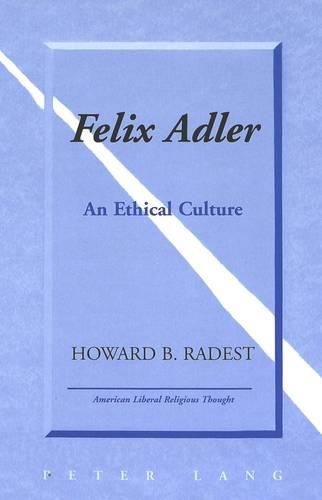Readings Newsletter
Become a Readings Member to make your shopping experience even easier.
Sign in or sign up for free!
You’re not far away from qualifying for FREE standard shipping within Australia
You’ve qualified for FREE standard shipping within Australia
The cart is loading…






Felix Adler, founder of the Ethical Culture Societies and of the Ethical Culture Fieldston Schools, was a social reformer and a religious radical. This book explores his proposals for the democratization of the moral ideal and the application of this concept to the reconstruction of industrial society. Challenging the moral credentials of both capitalism and socialism, he proposed a vocational democracy in which the talents of each human being were to be expressed in vocation, in politics, and in schooling. As a reformer, he moved freely from the world of experience to the world of ideas. As a religious radical he drew upon this dialectical move to reconstruct what he called the spiritual universe. Opposed to otherworldliness, it was for him an evolutionary outcome of the process of ethicizing experience, that is of reconstructing work, school, and politics in the light of the moral ideal. Unlike the utopians, however, he insisted that frustration and the pains of experience were inevitable. Although a progressive and a radical, he avoided the trap of facile optimism. He developed, therefore, an unusual integration of religious liberalism, social and educational reform, and a tragic sense of life.
$9.00 standard shipping within Australia
FREE standard shipping within Australia for orders over $100.00
Express & International shipping calculated at checkout
Felix Adler, founder of the Ethical Culture Societies and of the Ethical Culture Fieldston Schools, was a social reformer and a religious radical. This book explores his proposals for the democratization of the moral ideal and the application of this concept to the reconstruction of industrial society. Challenging the moral credentials of both capitalism and socialism, he proposed a vocational democracy in which the talents of each human being were to be expressed in vocation, in politics, and in schooling. As a reformer, he moved freely from the world of experience to the world of ideas. As a religious radical he drew upon this dialectical move to reconstruct what he called the spiritual universe. Opposed to otherworldliness, it was for him an evolutionary outcome of the process of ethicizing experience, that is of reconstructing work, school, and politics in the light of the moral ideal. Unlike the utopians, however, he insisted that frustration and the pains of experience were inevitable. Although a progressive and a radical, he avoided the trap of facile optimism. He developed, therefore, an unusual integration of religious liberalism, social and educational reform, and a tragic sense of life.